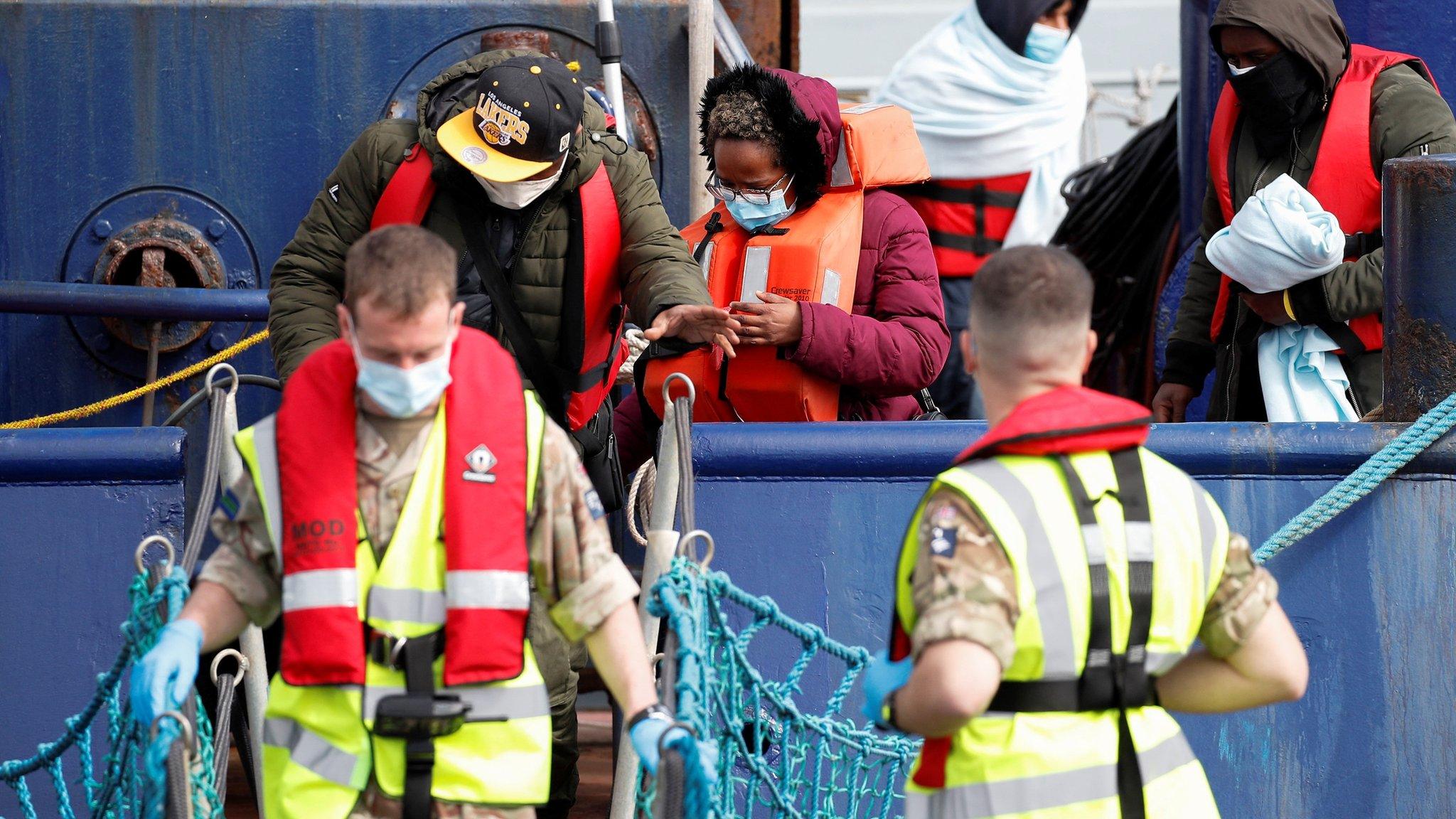Rwanda asylum plan: Number of people on first flight close to single figures
- Published
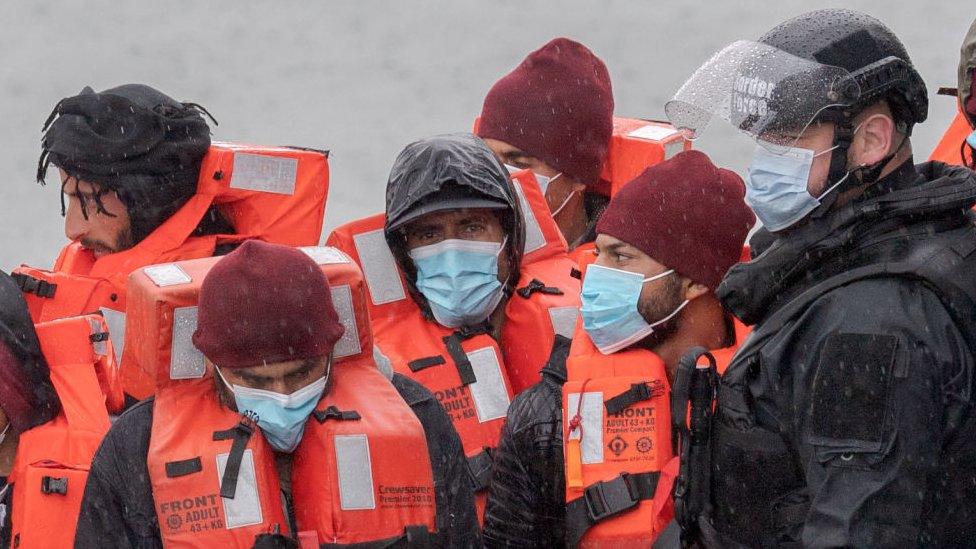
The number of asylum seekers due to be removed from the UK on the first deportation flight to Rwanda has fallen to close to single figures.
The Court of Appeal is set to decide later if the Home Office flight can depart as scheduled on Tuesday.
Campaigners and migrants last week failed to win an injunction against the government policy in the High Court.
But the planned number of removals has rapidly reduced, with 11 due to be on the first flight, the court heard.
A Home Office source told the BBC that, of the original 37 scheduled to fly, legal challenges relating to modern slavery and human rights claims have drastically reduced that number.
On Friday it emerged six people had their removal notices cancelled, while the Care4Calais charity has confirmed a further 20 planned removals were called off over the weekend.
This leaves 11 people still set to fly to east Africa on Tuesday, including four Iranians, two Iraqis, two Albanians and one Syrian, the charity said. The nationalities of the other two have not been revealed.
But BBC home editor Mark Easton says it is expected the total could be "whittled down to zero" before the plane is due to take off.
As of Friday, up to 130 people had been notified they could be removed.
The UK government has said sending some asylum seekers who arrive illegally in the UK to Rwanda will deter arrivals, and therefore undermine smuggling gangs.
The policy will see people given accommodation and support in Rwanda while their asylum application is being considered by the Rwandan government.
If they are successful, they can stay there with up to five years' access to education and support.
Those who fail in their asylum bids in Rwanda will be offered the chance to apply for other immigration routes, but could still face deportation.
On Sunday 111 people arrived in the UK in three small boat crossings , external- with more than 10,000 arriving so far this year.
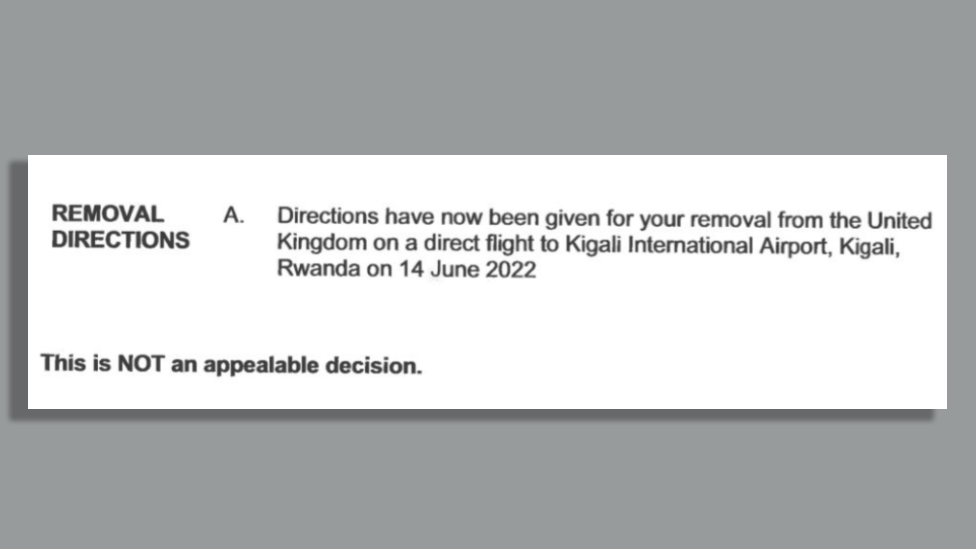
A document was given to some asylum seekers stating their removal could not be appealed, but at least 26 people have since been told they will not be on the first flight
The appeal to the Home Office's policy has been brought by the Public and Commercial Services Union, who represent 80% of Border Force staff, along with the charities Care4Calais and Detention Action.
Opening the appeal for the claimants, Raza Husain QC told the Court of Appeal it was not until Friday afternoon they learned of the full extent of serious concerns held by the UN's refugee agency about Rwanda's asylum system.
That was despite Home Secretary Priti Patel being fully aware of the concerns since April, he said.
Instead, the Home Office had earlier presented the UNHCR as assisting or supporting the Rwanda policy - a position he told the court was "misleading".
As a result, the High Court had got the law wrong when it had concluded there was no compelling reason to stop the flight from leaving, Mr Husain added.
The Home Office's lawyer, Rory Dunlop QC, said Tuesday's flight was important as the policy is "intended to deter dangerous and unnecessary journeys".
He said it could "could save lives as well as disrupting the model of traffickers" and cancelling the first flight could prevent the government from enforcing a policy that may deter dangerous crossings.
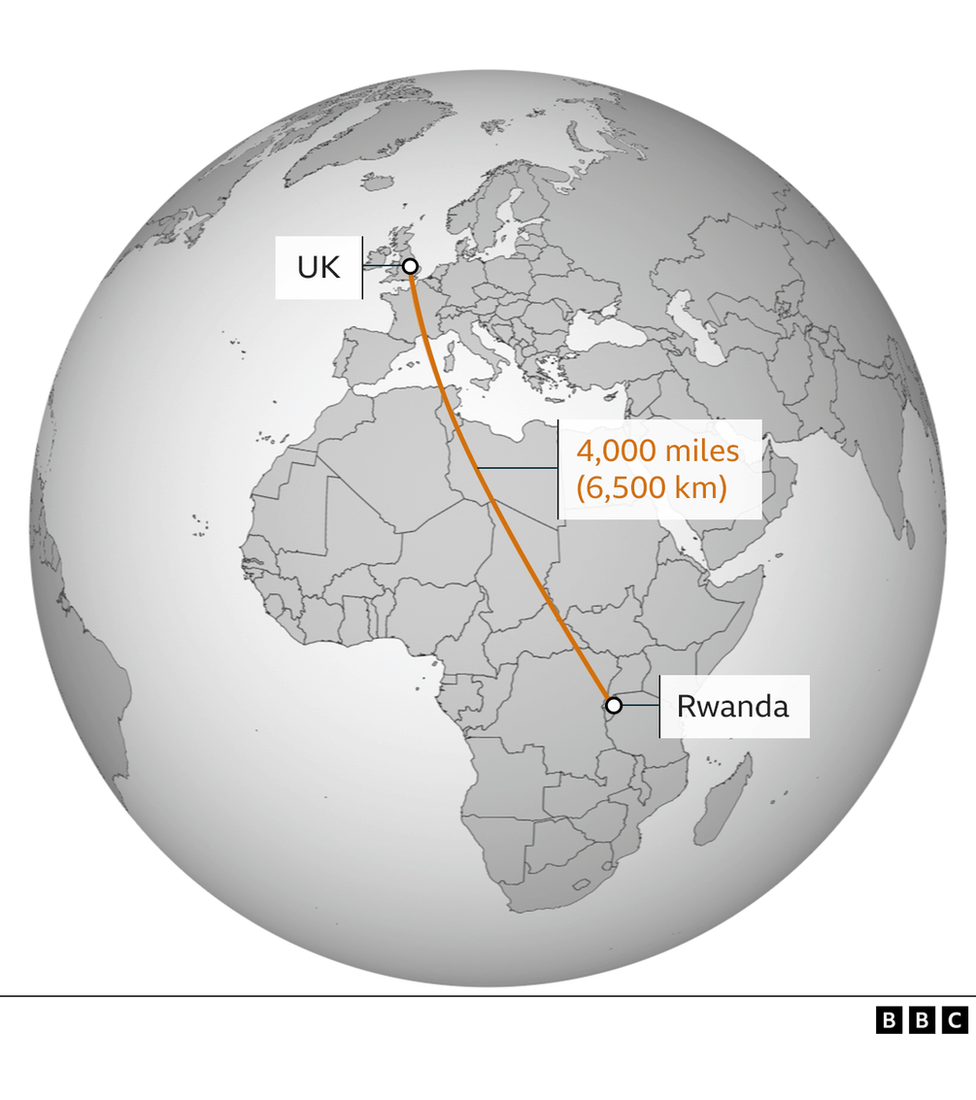
Prime Minister Boris Johnson said the government had anticipated "very active lawyers" would try to challenge the policy in the courts.
Speaking to LBC, he said activists "want to have a completely open-doors approach to immigration" and it was important that the government "stop criminal gangs" trafficking people across the Channel in dangerous boats.
"They are selling people a false hope, they are luring them into something extremely risky and criminal," Mr Johnson added.
A separate case is also due to be heard in the High Court on Monday, after another refugee charity, Asylum Aid, applied for an urgent interim injunction against the flights to the east African nation.
The Rwanda policy has been criticised by charities, religious leaders, opposition parties - and reportedly by the Prince of Wales, who privately described it as "appalling", according to the Times.
Campaign group Care4Calais, which is among those appealing against the High Court decision, wrote on Twitter: "We pray that the courts act today to stop this cruel and barbaric plan."
Rwanda's high commissioner to the UK, Johnston Busingye, told the Daily Telegraph, external his country would be a "safe haven" for migrants.
Tory MP Natalie Elphicke, who represents Dover, said it was disappointing the legal system is "being misused by political activists who support uncontrolled immigration", adding that people coming on small boats were "safe in France and many other places before France".
The government says the "vast majority" of those who arrive via illegal routes - such as unauthorised boats and stowing away in lorries - will be considered for relocation to Rwanda.
But it is understood that those prioritised under the scheme will be single adults, with officials insisting families arriving in the UK will not be split up.
At the High Court on Friday, Mr Justice Swift said there was a "material public interest" in the home secretary being able to carry out her policies. He said he did not consider there was evidence asylum seekers would be ill-treated in Rwanda.
He said there would be a full judicial review, where the High Court will hear a challenge to the government's plan, before the end of July.
A second case is also also being heard by Mr Justice Swift in the Hight Court on Monday, after refugee charity Asylum Aid applied for an urgent interim injunction to stop the Rwanda flights.

Iranian ex-policeman feared being killed in Rwanda
Among the people informed they were to be sent to Rwanda on Tuesday is an Iranian ex-police commander who fled the country after refusing to shoot protesters during anti-government demonstrations in 2019.
The former commander, who is not being named in order to protect his identity, was sentenced by an Iranian military court to almost five years in jail in Iran - and fears being killed by Iranian agents if he is deported.
The man previously gave testimony to the UK-based Aban Tribunal investigating alleged Iranian atrocities during the unrest, which estimates say led to the deaths of between 300 and 1,500 people.
After fleeing Iran, he lived in hiding in Turkey for over a year. He arrived in the UK via boat on 14 May and was immediately detained, and has been held at Brook House detention centre near Gatwick Airport since.
Last week he was given malaria pills in preparation for the trip, but refused to take them and claims to have told the officers: "You can only send my dead body to Rwanda."
He has since been told he is no longer facing immediate removal, after challenging his deportation in court, the charity Justice for Iran revealed on Monday.
"I have mixed feelings," he said. "I cannot be happy. My whole heart is with all the refugees who will be forced to take the flight to Kigali and seek asylum from the government of Rwanda and according to Rwandan laws."


LIQUID DIET: Are meal replacement drinks good for you?
'YOU NEED KINDNESS, BUT TOUGHNESS TOO': A day in the life of a school attendance officer

Related topics
- Published13 June 2024
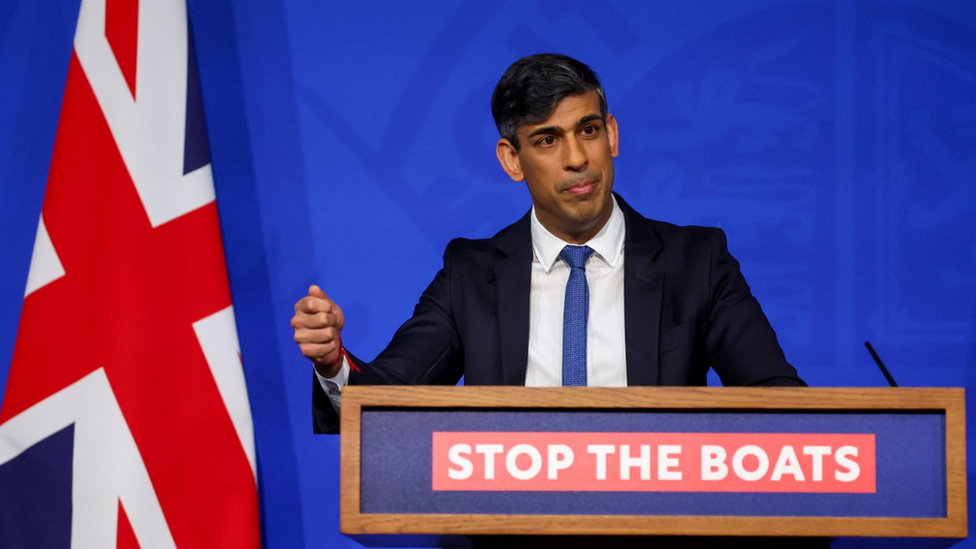
- Published11 June 2022
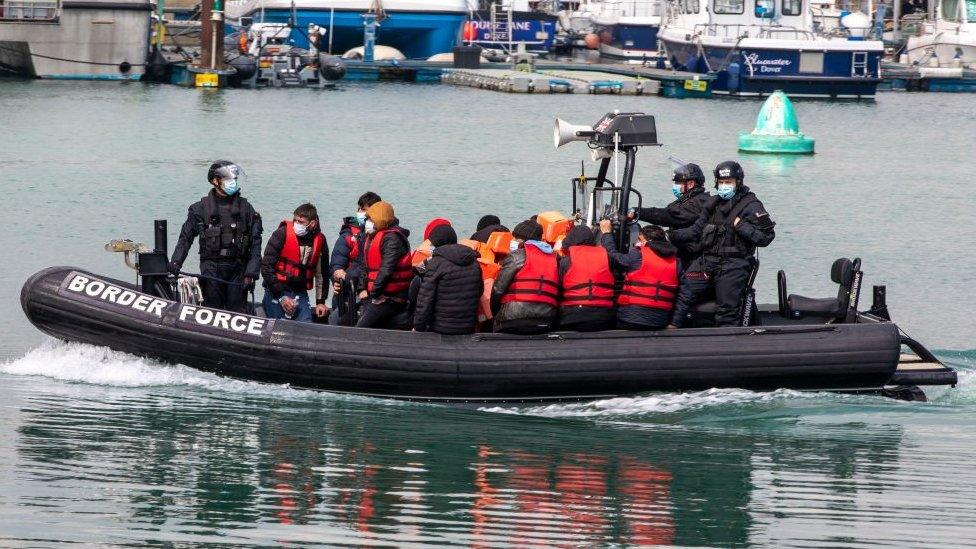
- Published11 June 2022
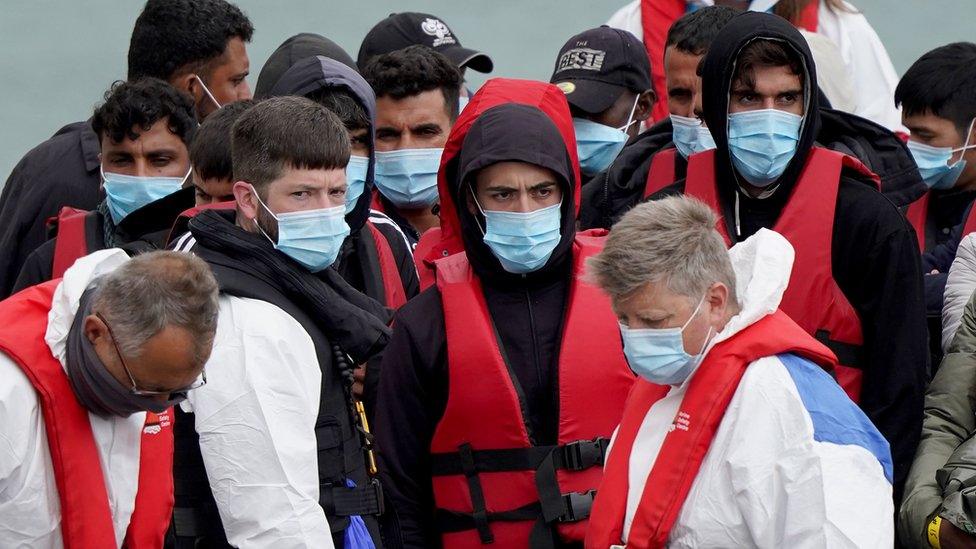
- Published10 June 2022
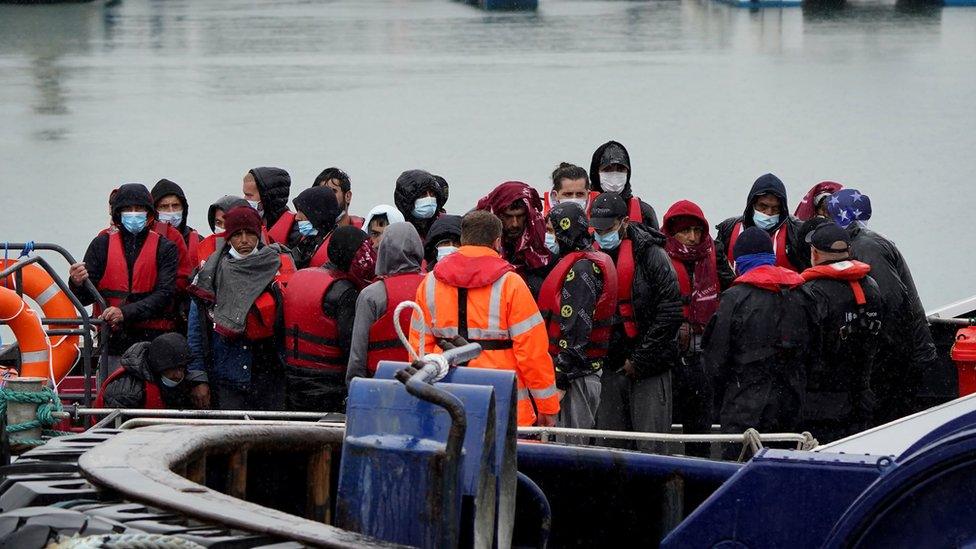
- Published20 May 2022
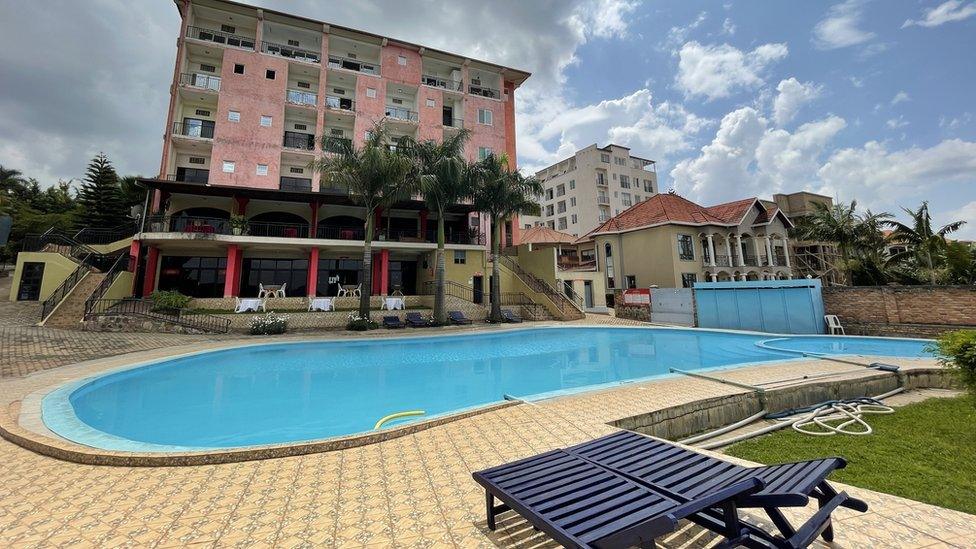
- Published14 April 2022
